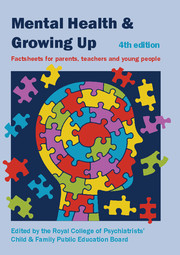Book contents
- Frontmatter
- Contents
- Contributors
- Factsheets for young people
- Factsheets for parents, carers and anyone who works with young people
- 1 Good parenting
- 2 The restless and excitable child
- 3 Dealing with tantrums
- 4 Children who soil or wet themselves
- 5 Sleep problems in childhood and adolescence
- 6 Behavioural problems and conduct disorder
- 7 Attention-deficit hyperactivity disorder (ADHD)
- 8 The child with general learning disability
- 9 Specific learning difficulties
- 10 Autism and Asperger syndrome
- 11 Depression in children
- 12 Worries and anxieties: helping children to cope
- 13 Divorce or separation of parents: the impact on children and adolescents
- 14 Death in the family: helping children to cope
- 15 The emotional cost of bullying
- 16 Traumatic stress in children
- 17 Domestic violence: its effects on children
- 18 Child abuse and neglect: the emotional effect
- 19 Drugs and alcohol: what parents need to know
- 20 Self-harm in young people
- 21 Psychosis
- 22 Schizophrenia
- 23 Bipolar disorder in children and adolescents
- 24 Obsessive–compulsive disorder in children and young people
- 25 Eating disorders in young people
- 26 Chronic physical illness: the effects on mental health
- 27 Medically unexplained physical symptoms
- 28 Chronic fatigue syndrome: helping your child get better
- 29 Parental mental illness: the problems for children
- 30 Who's who in CAMHS
25 - Eating disorders in young people
from Factsheets for parents, carers and anyone who works with young people
Published online by Cambridge University Press: 02 January 2018
- Frontmatter
- Contents
- Contributors
- Factsheets for young people
- Factsheets for parents, carers and anyone who works with young people
- 1 Good parenting
- 2 The restless and excitable child
- 3 Dealing with tantrums
- 4 Children who soil or wet themselves
- 5 Sleep problems in childhood and adolescence
- 6 Behavioural problems and conduct disorder
- 7 Attention-deficit hyperactivity disorder (ADHD)
- 8 The child with general learning disability
- 9 Specific learning difficulties
- 10 Autism and Asperger syndrome
- 11 Depression in children
- 12 Worries and anxieties: helping children to cope
- 13 Divorce or separation of parents: the impact on children and adolescents
- 14 Death in the family: helping children to cope
- 15 The emotional cost of bullying
- 16 Traumatic stress in children
- 17 Domestic violence: its effects on children
- 18 Child abuse and neglect: the emotional effect
- 19 Drugs and alcohol: what parents need to know
- 20 Self-harm in young people
- 21 Psychosis
- 22 Schizophrenia
- 23 Bipolar disorder in children and adolescents
- 24 Obsessive–compulsive disorder in children and young people
- 25 Eating disorders in young people
- 26 Chronic physical illness: the effects on mental health
- 27 Medically unexplained physical symptoms
- 28 Chronic fatigue syndrome: helping your child get better
- 29 Parental mental illness: the problems for children
- 30 Who's who in CAMHS
Summary
What are the signs of anorexia or bulimia?
You may notice some or most of these signs:
• weight loss or unusual weight changes
• periods being irregular or stopping
• missing meals, eating very little and avoiding ‘fattening’ foods
• avoiding eating in public, secret eating
• large amounts of food disappearing from the cupboards
• the person believing they are fat when in fact they are underweight
• exercising excessively, often in secret
• becoming preoccupied with food, cooking for other people, calorie counting and setting target weights
• going to the bathroom or toilet immediately after meals
• using laxatives and vomiting to control weight or sometimes using other medications/herbal remedies to lose weight.
It may be difficult for parents or teachers to tell the difference between ordinary dieting in young people and a more serious problem. If you are concerned about your child's weight and how they are eating, consult your GP. You can also seek help and advice from other agencies.
What effects can eating disorders have?
A person with an eating disorder can have physical and emotional problems. Some of these include:
• feeling excessively cold
• headaches and dizziness
• changes in hair and skin
• tiredness and difficulty with normal activities
• damage to health, including stunting of growth and damage to bones and internal organs
• loss of periods and risk of infertility
• anxiety and depression
• poor concentration, missing school, college or work
• lack of confidence, withdrawal from friends
• dependency or overinvolvement with parents, instead of developing independence.
It is important to remember that, if allowed to continue unchecked, both anorexia and bulimia can be life-threatening conditions. Over time, they are harder to treat, and the effects become more serious.
What causes eating disorders?
Eating disorders are caused by a number of different things.
• Worry or stress may lead to comfort eating. This may cause worries about getting fat.
• Dieting and missing meals leads to craving for food, loss of control and overeating.
• Anorexia or bulimia can develop as a complication of more extreme dieting, perhaps triggered by an upsetting event, such as family break-down, death or separation in the family, bullying at school or abuse.
• Sometimes, anorexia and bulimia may be a way of trying to feel in control if life feels stressful.
- Type
- Chapter
- Information
- Mental Health and Growing UpFactsheets for Parents, Teachers and Young People, pp. 121 - 124Publisher: Royal College of PsychiatristsPrint publication year: 2013



